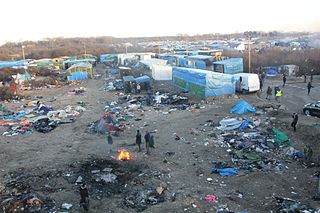BHRC says family reunion cases were poorly handled, leaving 400 unaccompanied minors stranded in France
The Bar Human Rights Committee (BHRC) last week released a report on its fact finding mission to the refugee and migrant "Jungle" camp in Calais.
The report's authors, Doughty Street's Kirsty Brimelow QC and Jelia Sane, undertook the fact-finding mission last October to observe the processing of the camp's estimated 1900 unaccompanied minors as it was being demolished.
 The 44-page report, which you can read here, examines the history and demolition of the camp and focuses on the subsequent progress of family reunification claims under the Dublin III Regulation as well as claims for admission to the UK under the Dubs child refugee scheme.
The 44-page report, which you can read here, examines the history and demolition of the camp and focuses on the subsequent progress of family reunification claims under the Dublin III Regulation as well as claims for admission to the UK under the Dubs child refugee scheme.
BHRC found that the demolition of the Jungle camp was rushed and French and British authorities failed to take effective steps to safeguard the welfare and safety of unaccompanied children, leaving many at risk.
"Children were subjected to a chaotic and unlawful age verification and registration process, based in many cases on physical appearance alone. The methods employed by officials were arbitrary and discriminatory. The delegation heard reports that the authorities did not provide any proper information to children about the age assessment process and that the guidelines that should have been followed were severely curtailed or ignored altogether," the report stated.
As the camp was being demolished, approximately 1,850 children were dispersed to reception centres across France. Home Office officials had initially travelled to the camp to conduct interviews for admission to the UK, but this was soon abandoned and the officials instead conducted the interviews at the reception centres. BHRC says this process lead to the transfer of approximately 550 children to the UK under the Dublin III Regulation. An additional 200 children were admitted under the Dubs scheme.
The report adds, however: "BHRC has learned that family reunion cases under Dublin III were poorly handled such that an estimated 400 unaccompanied minors claiming to have relatives in the UK are now stranded in France having had no proper decisions on their cases."
BHRC is also troubled by the decision of the UK government to cap the number of unaccompanied minors to be resettled from all of Europe at 280 and considers that the sudden cessation of the scheme is contrary to the spirit of the Dubs amendment.
BHRC Chair Kirsty Brimelow QC said: "The unaccompanied children of Calais have faced horror, both in their home countries and in France, in 'the Jungle' camp. Nearly a year later, the horror continues as children remain vulnerable to trafficking, abuse, starvation and disease, These children bear silent witness to the failure that was the demolition of the Jungle camp. They are the exclamation marks that should litter this report.
"The UK and French authorities have an obligation under national and international law to act in the best interest of these children—to ensure their safety and security, to provide a place for them to sleep and to live, and to give them an opportunity to be children again. The UK government must lift the arbitrary cut-off date for applications from unaccompanied children and increase the number of children it will accept under the Dubs Amendment."
In related news, the Office of the United Nations High Commissioner for Human Rights released a statement yesterday expressing concern that migrants are continuing to return to Calais and are living without shelter and proper access to drinking water, toilets or washing facilities.
A number of United Nations human rights experts urged the government of France to devise long-term measures to provide access to safe drinking water and sanitation for migrants in the area.
While a French court has ruled that the government has an obligation to provide access to water and sanitation to the migrants, local authorities in Calais have refused to implement concrete measures.
The Special Rapporteur on the human rights of migrants, Felipe Gonzalez Morales, said: "Human rights apply to all, including migrants-regardless of their status. Consequently, the legal recognition by the French court of the human rights obligation to provide access to water and sanitation should be commended, but the authority of those decisions is diminished if they are not implemented in practice."